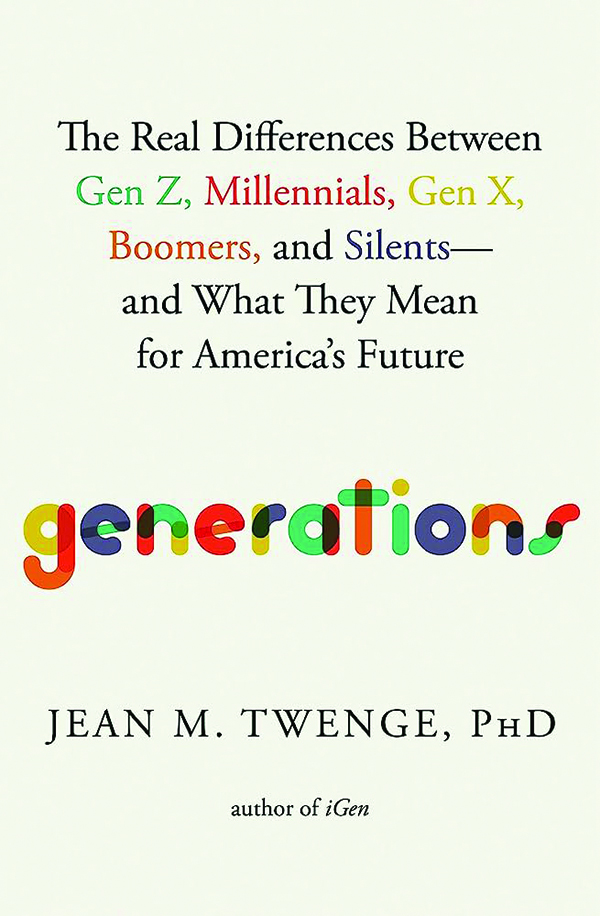
All the generational stereotypes are wrong, except that big one
Katherine Dee
Jean Twenge’s 500-page tome, Generations, which spans from the Silent Generation, born in 1925, to Polars, born between 2013 and 2029, is exploding with insights that should have been obvious but, for whatever reason, have been obfuscated. Things that you didn’t know because … well, why would you know? Millennials aren’t trapped in a one-long financial “struggle session”: Many of them are actually doing quite well. The Silent Generation was anomalously happy, particularly when compared to the Greatest Generation and boomers. (By the way, it was also the Silent Generation that ushered in “free love,” not boomers; the latter just get all the credit.) And yes, Virginia, the phones are making Zoomers depressed.

Depending on how you read it, Generations can be one of several quite different things. On one read, it is a hidden history or something similar to an astrology book, where you flip to your own generation for insight about yourself and perhaps a glimpse into your future. Or, looked at more deeply, it reads like a meditation on technology, in the spirit of Neil Postman or even Marshall McLuhan.
SARAH BERNHARDT AND THE INVENTION OF CELEBRITY
Of all the many ideas introduced (or reintroduced) in Generations, the most compelling is “the Technology Model of Generations.” It’s not wars or economic shifts that create generational divides — it’s technology. For Twenge, as it was for technological critics before her, cultural changes like same-sex marriage or having children later in life are downstream of tech. And not just the tired ones, like “Instagram filters led to an increase in cosmetic surgery.” Everything from microwaves to the Pill has shaped our culture in profound ways. Twenge defines technology as “anything that makes our modern lives possible, from medical care to washing machines to multistory buildings.” It’s her contention that major changes in technology and their aftereffects have broken the “old cycle” of generations to form something new.
Twenge starts her theory broadly. Technological progress led to twin phenomena: Individualism and a Slower Life Pace. In Twenge’s model, more technological progress goes hand in hand with individualism, a theme that figures prominently in the book. (She doesn’t say it explicitly, but Twenge seems skeptical of our ever-increasing individuality.) Technology also extends the human lifespan, leading to a slower pace of life: People take longer to grow up and longer to grow older. Of course, Twenge argues, that would change the architecture of each generation.
Generations is perhaps also a history of individualism itself. It’s one of many that’s been published this year, among them, including Amy Brady’s Ice, Tara Isabella Burton’s Self-Made, and, to a lesser extent, Mary Harrington’s Feminism Against Progress.
How do populations change as they become increasingly more individualistic? Some of these changes are good: The ascendance of equality is a major one. “Equality is one of the unifying themes of cultural change over the last one hundred years,” Twenge writes, “making it one of the unifying themes of cultural change.” “LGB” rights (curiously missing the “T”) and the civil rights movement are two shifts she doesn’t see as being possible without increased individualism.
But not everything is in the spirit of a better world. Some changes are neutral, the popularity of casual clothing being one of them. Others are more sinister, like the increasing rates of depression.
One question that Twenge’s Technology Model of Generations satisfies, and pretty compellingly, is why any of this matters at all. Why should your generation be any different than your star sign? When generations are looked at in any other way, the delineations between each group do feel arbitrary. In previous understandings of generational differences, particularly popular ones, everything seemed to rest on milestone cultural events, pop culture, and cheap stereotypes downstream of the two — things that most people would argue didn’t apply to them. Of course, people would be shaped by some major world events, but the idea that history could be meted out by generation felt flimsy at best. Is there a meaningful difference between someone born in 1994 and 1995, the cutoff and beginning years for millennials and zoomers, respectively? Maybe one of them remembers 9/11 more clearly (and that’s a big maybe), but otherwise, how significant could the difference really be?
But when viewed through the lens of technological change — generations are epochs of technology — the differences become easier to defend. It might still be difficult to make a compelling case for the difference between someone born in 1994 and 1995, but the gap between 1990 and 1995 comes into clearer view. Somebody born in 1995, for example, was more likely to have a childhood shaped by broadband internet and smartphones; somebody born in 1990 was a child of satellite TV.
Twenge’s Technology Model of Generations also answers a question that’s been gnawing at the “generation” discourse since the dawn of time: “How can younger generations be ‘too soft’ when people said the same thing fifty years ago?”
Well, the accusation is always right: Technology is making each generation progressively “softer,” which Twenge diplomatically defines as “less physically taxing.” Older people are wont to complain, but life really has gotten easier, and that’s because of technology’s impact. Even the gap between having to look something up in a physical dictionary or encyclopedia as opposed to Google, and then opposed to ChatGPT, makes a dent in our disposition.
She promises, though, that when she says kids these days are soft, her survey data rely on young people’s own reports, not the complaints of older generations.
CLICK HERE TO READ MORE FROM THE WASHINGTON EXAMINER
Katherine Dee is a writer and co-host of the podcast After the Orgy. Find more of her work at defaultfriend.substack.com or on Twitter @default_friend.
